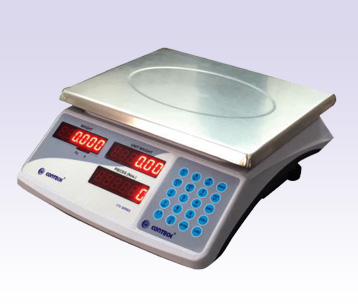Exactly How Commercial Scales Work: An Extensive Summary for New Users
Recognizing the auto mechanics behind industrial ranges is important for new customers that want to make sure accuracy in their dimensions. As we discover these parts, one should take into consideration exactly how these elements interact to enhance efficiency in diverse commercial applications.
Basics of Industrial Scales
Industrial ranges are important devices utilized across numerous sectors, consisting of production, logistics, and farming, to make sure exact weight measurements of hefty loads. The basic principle behind commercial scales includes the conversion of weight into a quantifiable form that can be shown digitally or analogically. These scales use different devices, such as load cells or mechanical levers, to figure out the weight of objects put upon them.

Along with their dimension capacities, commercial ranges are developed to endure severe environments, featuring durable construction that resists dust, dampness, and hefty effects. Calibration and upkeep are important to guarantee precision, as also small inconsistencies can lead to significant financial effects. By recognizing the fundamentals of industrial ranges, individuals can appreciate their importance in numerous industrial applications.
Kinds Of Industrial Scales
Various kinds of industrial scales deal with the diverse demands of various industries, each made to manage particular weighing jobs with accuracy and dependability. Among one of the most common kinds are floor scales, which are excellent for evaluating bulky and heavy things. These scales generally include large systems and can fit palletized goods, making them necessary in storage facilities and delivery facilities.
An additional type is bench scales, which are usually used for smaller sized things in manufacturing and retail settings. They supply exact measurements for products that require accuracy, such as chemicals or components in assembly lines (Industrial Scales). For mobile operations, portable ranges supply flexibility and simplicity of transportation, ideal for fieldwork or short-lived installations
In addition, specialized ranges like checkweighers are made use of in manufacturing lines to preserve quality control by guaranteeing that products meet weight requirements. Each kind of commercial scale plays a vital function in enhancing operational performance and precision throughout numerous fields.
Just How Considering Systems Work
Weighing devices are crucial parts that allow accurate dimension of mass throughout different industrial scales. These devices make use of different principles of physics and design to supply accurate weight analyses, necessary for stock management, quality assurance, and compliance with governing standards.
One common kind of weighing device is the tons cell, which operates the concept of strain gauges. When a tons is applied, the lots cell deforms slightly, creating an electrical signal symmetrical to the weight. This signal is then exchanged a legible weight measurement by the range's electronics.
An additional commonly made use of system is the mechanical balance, which utilizes a great site system of levers and weights. Industrial Scales. This approach depends on the concept of balance, where the weight of the things being measured is stabilized versus known weights, permitting direct dimension
Furthermore, hydraulic and pneumatic ranges leverage fluid characteristics principles to determine weight. These systems make use of the pressure put in by a lots to determine weight, offering high accuracy for substantial loads.
Appropriate Use Techniques
When using commercial ranges, adhering to appropriate use strategies is essential for ensuring precise dimensions and keeping tools honesty. Primarily, it is vital to pick the ideal scale for your particular application, as scales differ in capacity and precision.
Before evaluating, make sure that the range is placed on a stable, level surface totally free from vibrations or disturbances. This will help to minimize errors triggered by external factors. Additionally, calibrate the scale according to the supplier's specs prior to use, ensuring that it is working properly.
When placing items on the range, distribute the weight uniformly to stay clear of tipping or damaging the devices. Always permit the scale to maintain prior to taping the weight, as fluctuations may happen during preliminary positioning. For bulk materials, make use of containers that are appropriate for the scale dimension to avoid overloading.
In addition, stay clear of putting chilly or overly warm products directly on the range, as temperature level variations can influence precision. Maintain the evaluating system complimentary and clean of particles to avoid contamination and ensure dependable outcomes. By complying with these strategies, individuals can make best use of the performance and long life of their industrial ranges.
Maintenance and Calibration Tips
Making certain the longevity and precision of industrial scales needs thorough upkeep and regular calibration. A preventative maintenance timetable is vital; it must consist of routine assessments to identify deterioration, specifically on load cells and other sensitive parts. Frequently cleansing the range's surface and making sure the bordering area is without particles will certainly help preserve its stability and performance.
Calibration is just as essential and must be executed at regular intervals or whenever the scale experiences considerable adjustments in temperature level, moisture, or physical displacement. Utilize licensed calibration weights that are deducible to nationwide standards for accuracy. File each calibration session thoroughly to track efficiency with time and recognize any trends or recurring issues.
Train all operators on correct range use and maintenance methods to make certain constant performance and precision. By sticking to these maintenance and calibration tips, customers can improve the reliability of their commercial ranges, guaranteeing optimum procedure in any type of setting.
Verdict

Recognizing the technicians behind commercial ranges is crucial for new customers that desire to important site make certain precision in their dimensions.Industrial ranges are necessary devices used throughout different markets, consisting of manufacturing, logistics, and agriculture, to guarantee accurate weight measurements of hefty lots. The basic principle behind industrial scales entails the conversion of weight right into a quantifiable type that can be displayed digitally or analogically. By understanding the basics of commercial ranges, individuals can appreciate their importance in numerous commercial applications.
In final thought, comprehending the operation and upkeep of industrial scales is crucial for ensuring exact weight dimensions in different applications. (Industrial Scales)